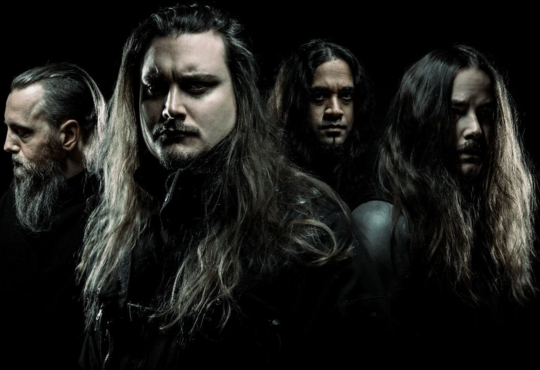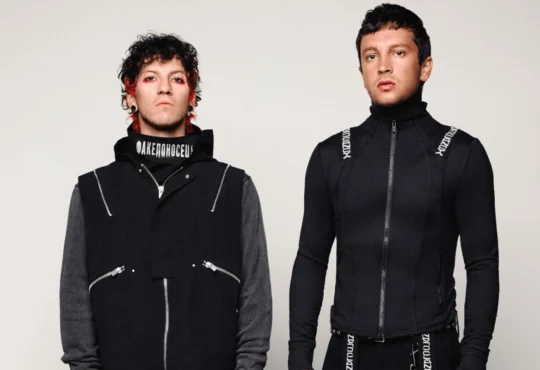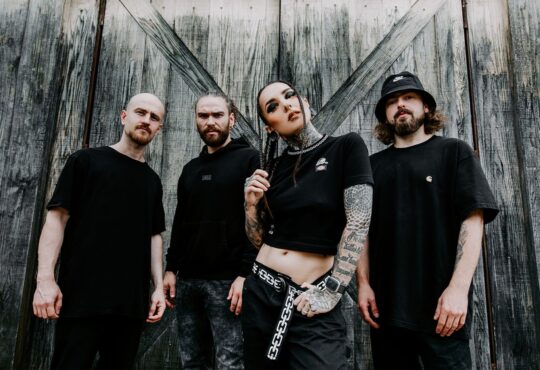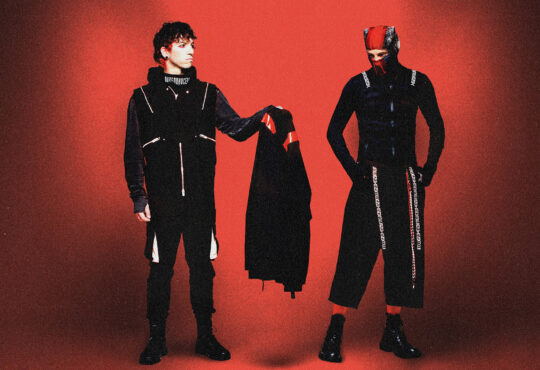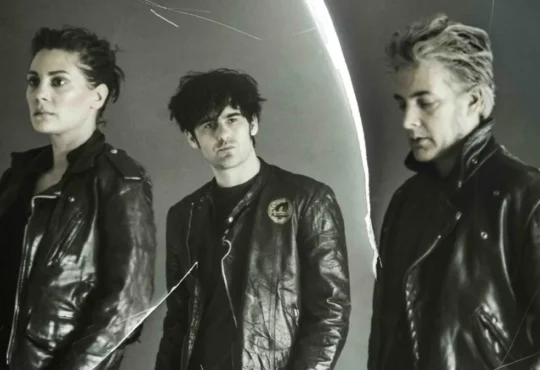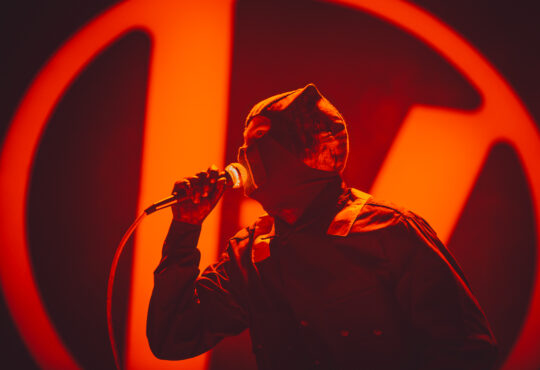On a nice sunny Wednesday afternoon, RockUrLife had the chance to meet the American duet Twenty One Pilots and chat about the new album, “Blurryface”.
Hi Twenty One Pilots. Hi Tyler and Josh, how are you today with this powerful sun?
Josh Dun (drums): Good! The sun is super energizing. It’s good to see the sun out today, that’s cool.
Is that the first time you came in France only to do some promo?
Tyler Joseph (vocal/piano): I think, so. This is actually our first promo run in France.
And have you find the time to take a walk in Paris or visit some cool places?
T: I wished! We landed today and we went straight here, unfortunatly. But I’ve been here in Paris for several times!
J: We’ve been in Paris two times for two Twenty One Pilots shows and we also did a show in Arras. Actually, I’ve already been to the Eiffel Tower so that’s cool. (laughs)
So did you Tyler, right?
T: Yes. Well, I walked under it (laughs) so it doesn’t take much work.
Today we’re here to talk about “Blurryface”, your new album. But first, we’re going to talk about what you learned from the “Vessel” release (2013). Thanks to it, you had the chance to visit many countries and meet a lot of people while spreading your songs. How did you feel about the end of the heavenly period?
T: (think) “Vessel” was exactly what we wanted it to be musically. But we didn’t know who was going to listen to. We wrote songs not knowing if anyone would care. So there was a bit of recklessness because it didn’t matter it worked or not. Definitely some fearlessness as well! But at the same time, we kinda had to learn who to put on a live show and all these different things we now know. I guess it’s the biggest thing when I think about that album : we learnt so much of each other, we learned so much of ourselves. And when it was over, as it was closing, I don’t think that we were sick of the songs even though we toured for like 3 years. But I would say that we were hitching to play some newer songs that we’ve been writing. A lot of bands take a break between records but we went right into recording as soon as we could. We wanted the transition area to be as quick as possible.
Musically, you were and still are that kind of hybrid bands with its own style and personnality. But, at this time, was that difficult for you to find a seat in the orchestra of the music universe? Because you know the fact that you’re a duet and a lot of bands are composed of at least 3 or 4 members.
J: Especially when we were starting out and no one really knew who we were. We had a friend of ours that booked shows for us so we did local things, sometimes a festival things, sometimes a heavy metal thing and we were put in the middle of the day. And like you said, it’s just the two of us and we’ve always been a little bit insecure about that…
Really? Why?
J: Just because all the bands that we kinda grew up watching or listening to were always 4 or 5. Who could we just have two people? It was sometimes weird for us. But in a way, it worked for us because it’s a bit unique and people have accepted the fact that it’s just the two of us on stage.
T: Ultimately, we wanted to do something new and we learned that if you’re not uncomfortable, you’re probably not doing something new. So when we talked about “is it even okay to have only two members in the band”, that’s just us being transparent about that, being uncomfortable. But we know that this is the right thing.
And is there more pressure to be only two in a band?
T : (forthright) Absolutly. You know, there is pressure to entertain people and to put on a show. There is not a lot to look at on stage and so we pushed ourselves, take up as much people attention as possible. The fact of doing a show forces us to reach further than we would have had to reach if there were more guys in the band.
Is being a duet force you to play characters on stage?
T: In a sense, the person that I am on stage is how I am. But that version of me isn’t allowed to be revealed in the everyday life. It could only exist on stage and wouldn’t fit in or function anywhere else. The stage gives you that hability to be that person that you ultimately are but you’ve always felt like it was unappropriate to be a normal social settings. It’s more like an outlet and we use live music as an outlet in a sense of a character but also for ourselves.
The success of “Vessel” carried you on tour with rockbands like Fall Out Boy, Panic! At The Disco. Weren’t you scare about the fact of not being expected?
T: We didn’t know if we would fit in at all like what Josh said. Our shows as a local band, we never fit in. Between hardcore shows, pop punk shows, indie shows, we never fit in. We always stood out in a sense that even if we felt uncomfortable, it was a gift and an asset we should use to be different. So I think it’s still apply whenever we’re open up for other bands. It may not exactly what people are expecting.
So Twenty One Pilots was made to do headline shows and to prove its own style can fit with other artistic performances?
T: Yes. We had a lot of opportunities, recently especially, to be a opening band or a direct support on bigger bands tours and I think our responses was “we’ve always done it ourselves”. For example, Paramore took us out in Australia. We’ve never been to Australia before and everybody knows it’s hard to go to a country and start something. So this tour helped us to create a story in Australia. But there’ve been a lot of other situations where we said “we want to go in right away, do our own shows even in front of 200 people”. It sets us up to be a headline act and it’s what we want. There’s a lot of band that feels like being an opener is gonna do it but you’ve got to prove yourself as a headliner, as the reason people are going to the shows.
“Blurryface” is your fouth album which was released last month worldwide. What’s the story behind the title? It seems like, with this title and this dark artwork, you aim to disturb or at least, expecting people to think about life and personnality
T: For me, personally, I was working through some things you can label as insecurity or multiple insecurities. And to better understand those insecurities and know how to defeat them, I wanted to gave them a name, a face and a backstory. Ultimately be able to cross the table and look at that thing and figure out how to defeat it. Those insecurities are manifested in the character “Blurryface”. I wouldn’t say this album is a concept record but there’s definitly a commun thread running through each song. And this thread is not only on the record, it’s also there when we’re playing live and at the end, there’s something like a victory. Not so much like our band beats the other band, it’s a victory inside ourselves and it’s something people really can relate to. There’s no reason to create music if you’re not trying to say something that people could use or relate to or understand. That’s the quick story behind what that record represents and it goes much deeper than that, obviously.
So you’re a bit socially afraid of life or the fact of living?
T: Along with a lot of people our age, I think that we have a lot of big questions like “what’s the point?”, “Why am I here?”. Those kind of questions, the older you get, the more that you stop asking yourself. We’ve been lucky enough to use music to continue to ask ourselves those questions and sometimes, the answers are scary like “I don’t know”. And when you answer the question with “I don’t know”, it makes you question a lot of things. So music will always be kind of a diary and when you see inside of that, you see me answering that question “I don’t know” but at the same time we don’t wanna create something hopeless. There’s gonna be a chance, a glimmer of hope in the end. That’s something we need to be carefull of.
At the end, we can say that this album is a bit of a guidance, right?
T: Well… For me, for sure! But for other people who think that, it is a honor because we’ve been helped and guided by so many different music. For me, this album is talking about what you believe, what you hate, what you hate about yourself and it’s hard to speak about those things sometimes. The best way to do it for me was to put it on a record. The deeper and deeper you’re asking questions about it, the more you start feeling uncomfortable. I could honestly write a book about each song but I just don’t wanna be around when you read it.
Didn’t music give you insurance to yourself through live shows?
T: The answers to these questions won’t be found in success. If we’re trying to fill an empty space with success, fame or money, this is not gonna work. We all know that. It doesn’t matter how much money you make, there’s still that void you need to fill. I don’t know about you but Josh and I, we know each other well enough and we’ve talked about what we think that can fill this void right now. But we will never say to people “hey, this is how you have to fill your void” because this is something that works for us. This is really talking about trying to figure out what that thing is. It’s pretty heavy and i’m just glad we can play music, tho.
All the singles, “Fairly Local”, “Tear In My Heart” and “Stressed Out” were released with a video in a little bit more than a month. What was your strategy and do you think video is a good tool to discover and understand your music?
J: Definitely. We always thought that videos are important, even since we were kids. We were going to the movie theater with our parents and we saw that something is moving about that and there’s something moving inside of you. It’s not only a great form of intertainment, it’s also usually inspiring. Before our trip to Paris, we were watching movies so you know, there is something about this media. When you pair a video, something that can stimulate you in that way, with audio, something amazing can happen so we wanted to have as much videos as possible. We’re still working on stuff right now.
T: We have a brand new video we haven’t released yet. The guy who does our videos was my roommate for a very long time and lives in the US. Our team is just a bunch of guys who’ve known each other for a while with Josh and I, obviously our tour manager and all our friends. It’s a cool group of people.
In those videos, in addition to the classical masks, Tyler appears with black painting on his body. Can you explain us this evolution? Is that a metaphor that expresses a desire to disappear or more like a quest for identity?
T: I’m going back to this “Blurryface” character. It represents insecurity and when I think about insecurity, I think about a couple of things. One, the insecurity of taking the stage, being in front of people and feeling expose : you will feel like suffocating, like you can’t breathe. That’s why the neck for me is an important part of manifesting the character. The other thing is that i’m creating music with my hands, as an artist. When I’ve got to show you this piece of art, it’s like “what are you gonna think?”, “Am i even good?”.. you see what I mean. The things i’m creating with my hand and the feeling of suffocating are two ways of manifesting this character in myself, like an internal struggle.
Besides the classical folk and pop songs like “Not Today” and “We Don’t Believe What’s On TV”, most of songs on “Blurryface” looks more agressive and hybrid than the old ones, with more synthétizers, more wild sounds and electro touches. An intention to not repeat yourself and try different tools to reinvent your image?
T: We are not trying to reinvent something, we just felt the need to try new stuff. We wanted to make out a record that was as crazy as possible, that makes no sense. It’s just truly a bunch of songs that we love. We wanted to make a record that the younger selves would buy or want to be a part of.
The main thing to say is it’s not a messy record because everything seems to be linked…
T: Thank you! That’s one of the biggest compliments we can get because when you write each one of these songs individually, you try to put all the stuff in a vacuum and say “does that even make sense?”. So the fact that you can tell there’s a commun thread running through them all is the thing.
To finish, our website is called “RockUrLife” so what rocks your life ?
J: Good question. I don’t know…
T: I change everyday between live music and writing songs. Those two things. It’s never both because I wouldn’t be able to handle both. When I wanna do those things, it’s when I feel like i’m doing what I was creating to do.
J: Oh, such a cliché but I would say “adventure”. The writing and recording process are just two crazy things but taking that on the road, in a new city every single day is awesome. Meet different people, see different venues, different cultures and how people can react to live songs… I think about this sometimes, about how our schedule is crazy. We never really stay in one place for a long time but if I was, I would probably go insane. So I guess that our lives are kind of an adventure in every different aspects.
Website: twentyonepilots.com


















